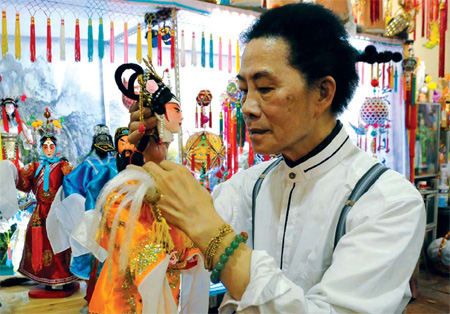Traditions give Chaozhou special appeal
The old city of Chaozhou, in eastern Guangdong province is now holding its 2011 China Chaozhou Flower Lantern Festival, from Feb 17 to 22.
The Lantern Festival itself takes place on the 15th of the first lunar month, and marks the end of China's 15-day Spring Festival. This year's Lantern Festival falls on February 17.
The old city's flower lantern is one of its 12 cultural items that are found on the nation's cultural heritage list. And the flower lantern gala is the biggest event of its kind ever held in the city.
The Chaozhou flower lantern dates back to the Tang Dynasty (618-907), but remained popular among locals until around 1910. The craftsmanship that goes into making the flower lantern makes it a Chinese folk treasure.
"This flower lantern festival is expected to provide a brand-new forum for the cultural characteristics of Chaozhou people all over," explained Luo Wenzhi, the municipal Party secretary.
"We're going all out to turn the event into a prominent Chaozhou culture brand," Luo said, adding, "We'll use the event to showcase the flower lantern craft and allure, and the folk customs.
|
 |
|
Local craftsman at work on a flower lantern. This craft in the southern Chinese city has a long history. Provided to China Daily |
"We'll also have displays of the city's latest social, cultural and economic developments for the whole world to see, especially Chaozhou people living elsewhere."
The whole festival centers family, harmony, and prosperity themes, and consists of a big Chaozhou flower lantern show, an exhibition of local cultural heritage, and a folk culture photo show.
Over the next couple of days there will be the lighting ceremony, a procession, a grand Lantern Festival party, and folk custom experiences for the media.
The locals are being encouraged to get involved in the contests that involve making flower lanterns, performing with gongs and drums, and a knowledge of local folk customs.
"This year marks the beginning of the 12th Five-Year Plan (2011-2015)," Luo commented. "The festival will be good for the city's attempt to promote its traditional culture, to preserve the cultural heritage, and to integrate cultural development with economic and social development over the next five years."
















